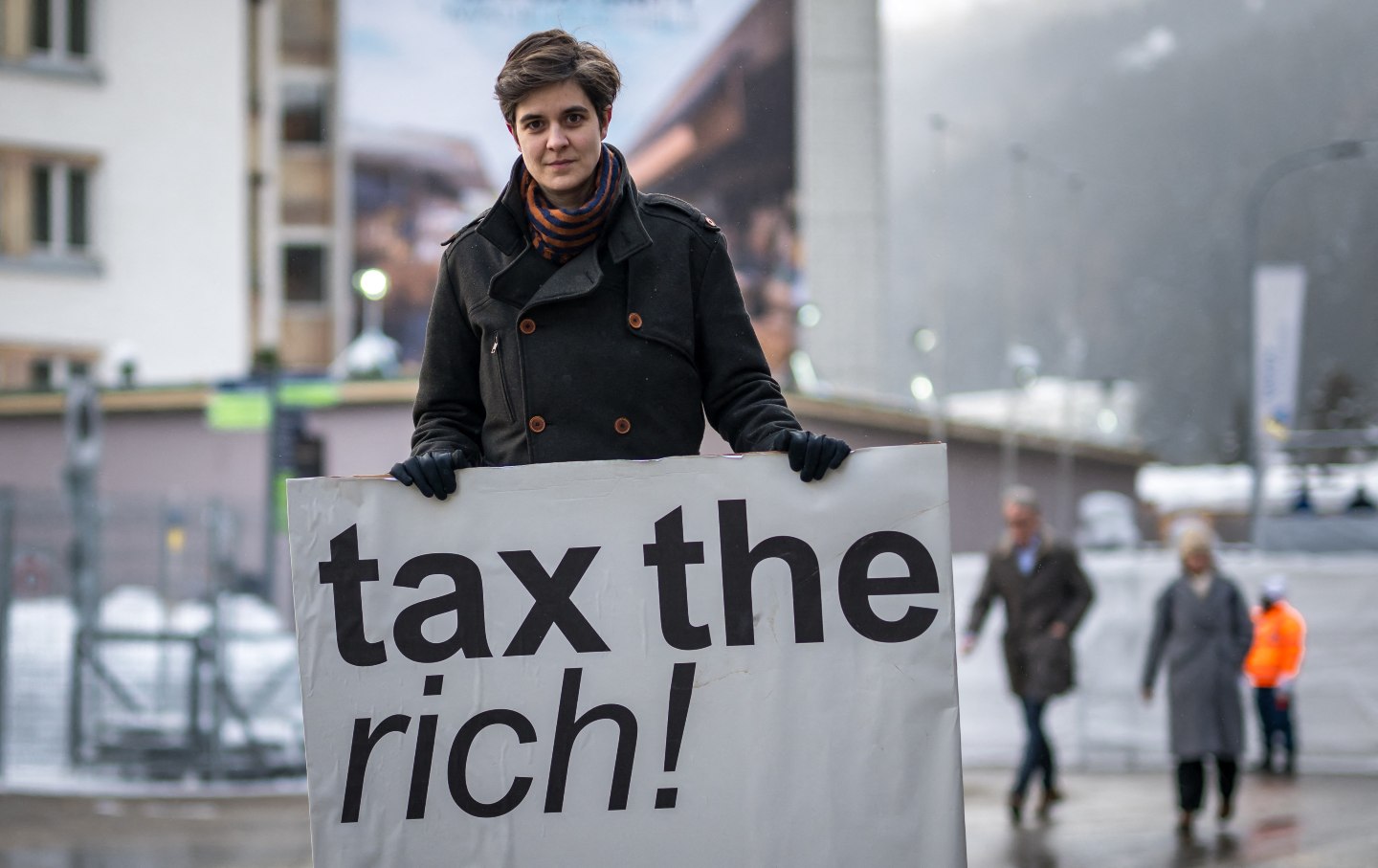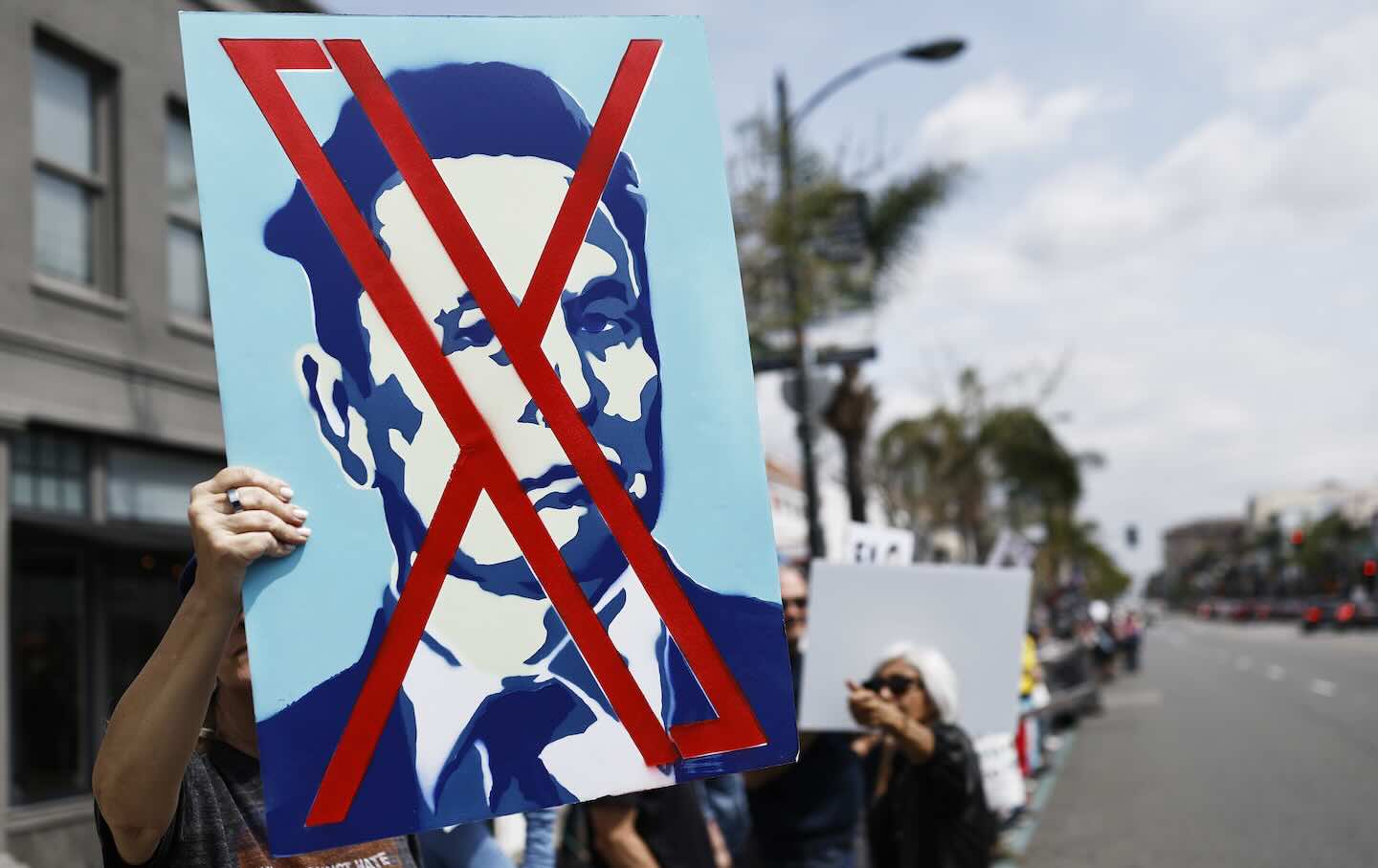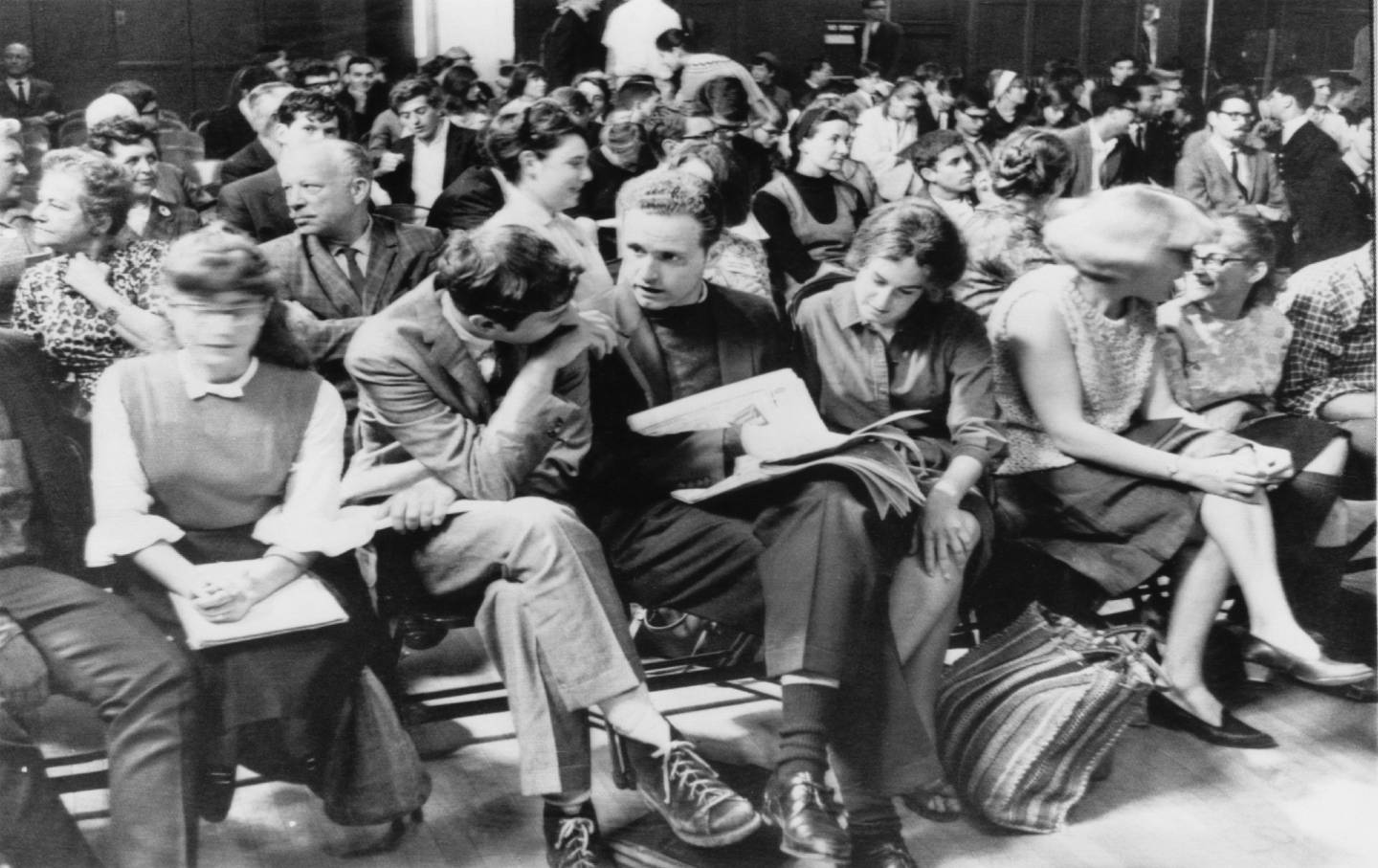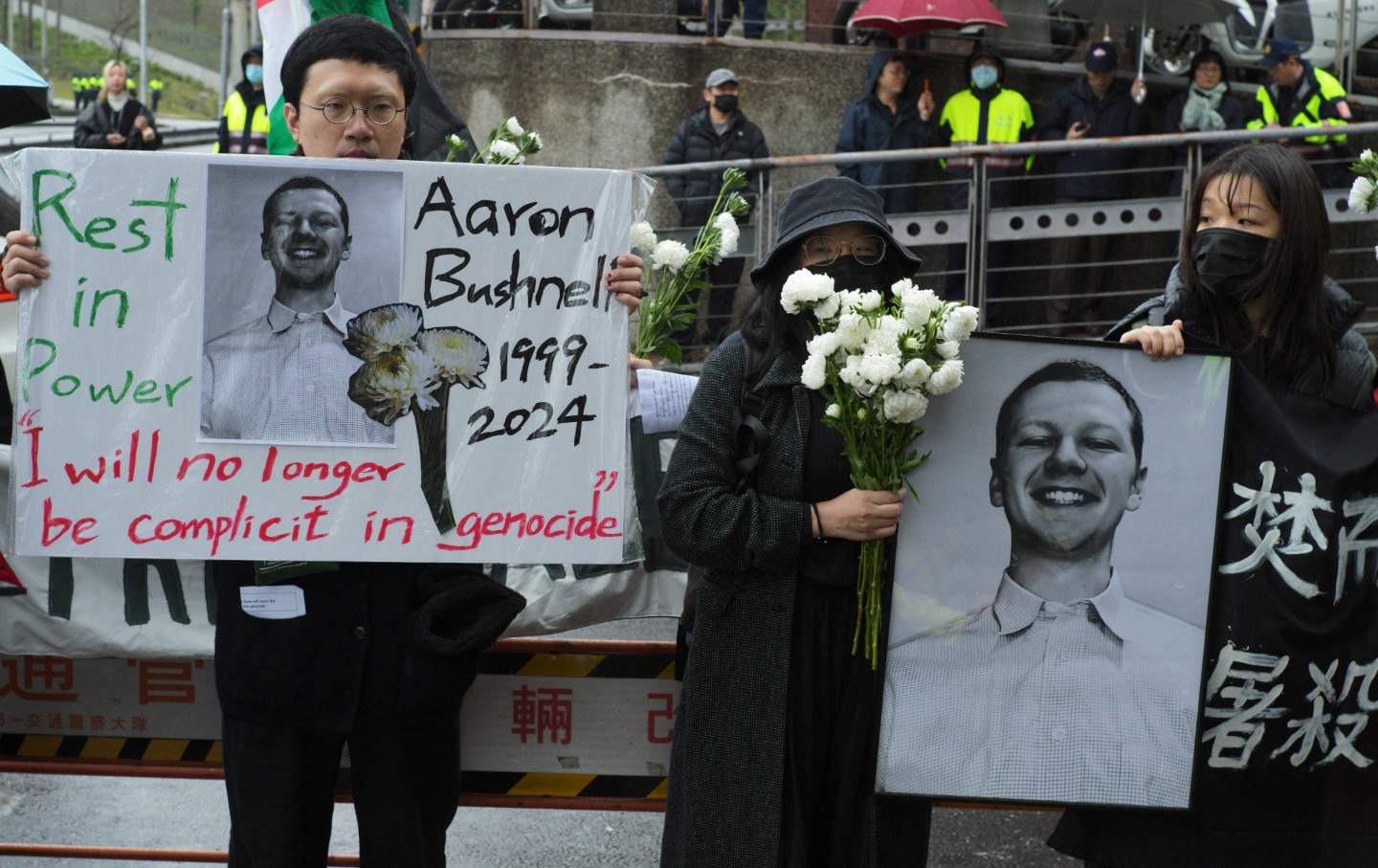This Austrian Heiress Wants to Redistribute Millions of Dollars
Marlene Engelhorn has committed to giving away 90 percent of her wealth. Will a council of citizens be able to decide how to spend it?

Austrian Marlene Engelhorn, whose wealth originated in the German chemical giant BASF.
(Fabrice Coffrini / Getty Images)On January 9, an unusual letter arrived in the mailboxes of 10,000 randomly selected Austrians. The letter explained that an heiress had lost patience with the government for not taxing her wealth, and had decided to form an assembly of 50 everyday people to redistribute it for her instead. Enclosed was a survey, mostly about demographics, but also the question: “Do you think the distribution of wealth in this country is fair?” Recipients who returned the survey became eligible to join the assembly, which would decide over the course of six weekends what to do with €25 million (about $27 million USD). The heiress, who would have no say in any part of the process, was calling it the Guter Rat für Rückverteilung—the Good Council for Redistribution.
Marlene Engelhorn did not expect that giving away her inheritance would end like this, by mailing a Willy Wonka–like proposal to scores of strangers. An heir to one of Europe’s largest chemical and pharmaceutical fortunes, she has spent the last three years campaigning for European governments to tax the rich as part of a global movement of wealthy young people seeking to undo the systems that allowed their wealth to accumulate. (Austria eliminated its inheritance tax in 2008.) “I have always said that I don’t want this wealth, that it’s a systemic failure for me to have it to begin with, and since I won’t be taxed quickly, I will have to redistribute it,” she told me. “I want to prove that people will make good decisions if you trust them and give them the power to do it.” Engelhorn is not the first to cede power to the non-wealthy in deciding what to do with her money. But she is the first to turn her redistribution into a public reckoning with wealth, inequality, and the power of democracy to address both.
Local, state, and federal governments in about two dozen nations, mostly in Europe, have convened citizens’ assemblies like the Guter Rat in the past 20 years, to make decisions about issues ranging from youth development to the legacy of concentration camps. Each one gathers a small group of people representing a larger community to address a difficult problem—democracy by sortition, as the ancient Athenians intended. A case study of a 2017 assembly found that participants were “[surprised] in regard of the quality of dialogue, were content with the recommending character of the results, [and] got motivated for further political participation.” Because citizens’ assemblies are made up of regular people, not politicians, their conclusions are usually popular: A national referendum legalizing gay marriage in Ireland that originated in a citizens’ assembly passed with 62 percent of the vote.
Austria leads the world in convening citizens’ assemblies. The most prominent was the Klimarat, organized in 2022 by the Austrian parliament in response to public pressure to address climate change. Its 100 members produced 93 policy proposals for bringing Austria in line with its commitment to the Paris Agreement—most of which the government then ignored, Engelhorn says. “It ended with, ‘Wow, that’s a wonderful democratic process you’ve had, and we’re not going to do anything about it.” That is not an option here, since Engelhorn’s influence on the Guter Rat legally ended when she announced the initiative on January 9. Either the assembly comes to an agreement in June on a directive for her bank to carry out, or they cannot agree and the money reverts to her. At that point, she’d have to try something else.
In designing the Guter Rat, Engelhorn’s team, led by project manager Alexandra Wang, closely followed much of the Klimarat’s structure. Like the earlier assembly, the government’s residential registry provided a list of addresses. “Even though we are a private organization, they were willing to give us these addresses because we are asking a question of public interest,” Wang says. As responses to the letters arrive—there have been 1,264 as of yesterday—a statistical firm will compose an assembly representative of Austria as a whole, regardless of citizenship status. Beginning in early March, the assembly will meet for six weekends at a hotel in Salzburg to deliberate, hearing from experts on economics, wealth, and philanthropy, even a philosopher to guide a discussion about what it means to have enough. And despite not being focused on climate, the Guter Rat will heavily feature it, says Wang: “We have to look at climate as an aspect of wealth redistribution, since people with yachts and jets emit so much more CO2 than a normal person.”
Although the process is set up to strip Engelhorn of her power, her beliefs are still embedded in it. She did not choose which experts would speak at the assembly, but she helped to decide which topics needed to be included. She has restricted where the money can go, or rather, where it can’t: The Guter Rat cannot donate to organizations that promote racism, xenophobia, or other forms of hate. It cannot fund organizations that deny climate change or campaign against higher taxes. Nor can it fund religious groups, start its own political party, invest in a profit-making business, or pay its own members or people they know personally. Any other outcome that the assembly can reasonably argue addresses wealth inequality is fair game, including giving money to individual people, UBI-style.
Built into, and parallel to, the assembly’s conversation about redistribution is a conversation about—and exercise in—democracy. Before they even get to discussing wealth, the group will spend its first meeting deciding how to make decisions together and negotiate conflict. Citizens’ assemblies operate on the principle of consent, meaning that all 50 members of the Guter Rat must agree about how to redistribute the money, winning over holdouts through compromise and negotiation. “The most precious thing for me is seeing people learn to work together, not just to say, ‘I’m right and you’re wrong,’” says Karin Küblböck, a facilitator for the Guter Rat who also co-designed and -facilitated the 2022 climate assembly. “Our daily task is really to have a good dialogue and develop something that is more than the sum of its parts.”
To ensure that wealth inequality is not replicated within the Guter Rat itself, every aspect is designed to be as accessible as possible. All expenses to, from, and during the assembly are covered, and participants are paid for their time. Interpreters are available for non-English speakers, as is a childcare stipend, and dietary options that account for two of the weekends falling during Ramadan.“In the invitation we also wrote that if there’s something we missed that would allow you to participate, please let us know,” Wang says. Offering so many options, and paying people generously to run the process, is expensive: Engelhorn set aside an additional €3 million for administrative costs. The accessibility extends past the assembly itself, and outside Austria, too: Every aspect of the Guter Rat, from its budget to the expert presentations, will be available online for anyone to watch, read, and learn from, creating a repository of information for people interested in the issues it’s addressing.
Following her family’s wishes, Engelhorn has never confirmed how much money she has. But she says that between the money she’s given away since 2019 and the €28 million set aside for the Guter Rat and its administration, she will have redistributed 90 percent of her current wealth when the assembly concludes. She expects to receive more over the course of her lifetime as older generations pass away, which may also redistribute according to the Guter Rat’s decision, she says.
Wang and Küblböck say they are confident that the assembly will successfully redistribute the money. But even if it doesn’t, they will consider the project a success, solely for its exercise in democracy—and its challenging of the status quo. “I know things will go wrong because no one has ever done this before, but I get comfort knowing that no matter what, this will be a beacon for more projects like it,” says Wang. “Taxes are the ultimate goal, but if governments, or the people behind governments, are just too greedy, this is an instrument people could begin to use worldwide.”








